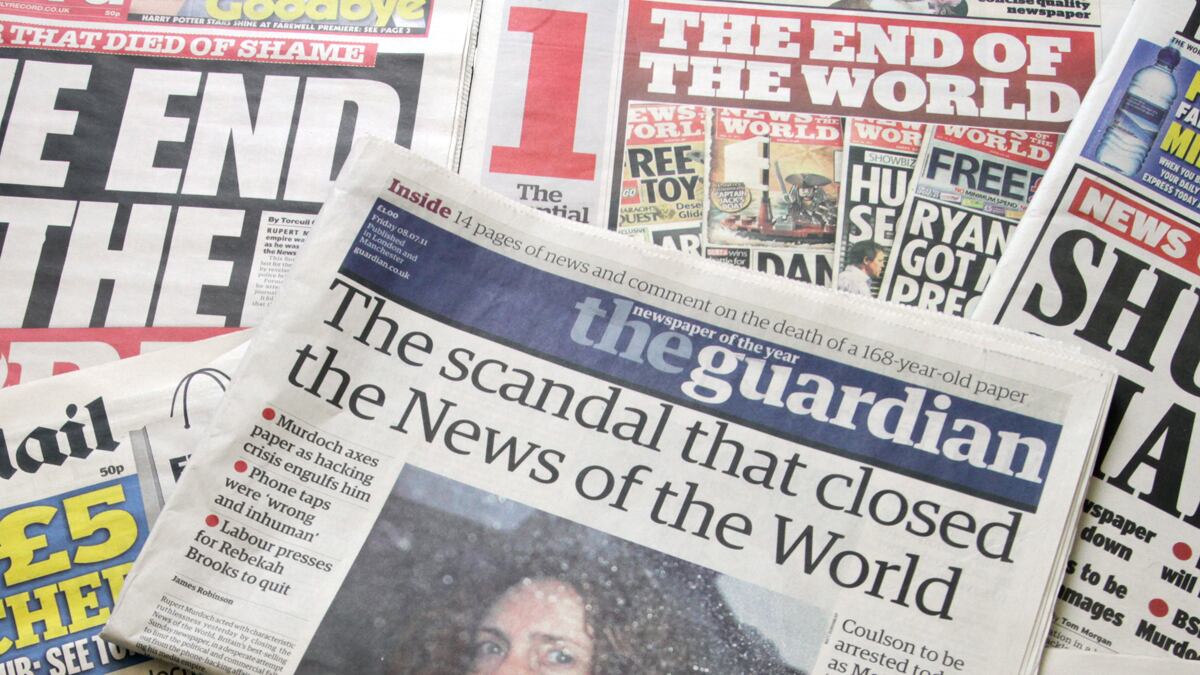A sensible person tasked with drawing up a list of people likely to be arrested in connection with the phone-hacking saga that has disgraced Rupert Murdoch's British media empire this summer probably wouldn't think to include the journalists who have broken more stories about the scandal than anyone else. A sensible person, therefore, would have no role at the Metropolitan Police.
Extraordinarily, London's finest have requested court orders to compel Nick Davies and Amelia Hill, reporters at The Guardian, to reveal their sources—sources inside the Metropolitan Police itself. The sources have perhaps been shamefaced by the manner in which the police have persistently bungled their operations despite ample opportunity to correct their mistakes. They have been instrumental in keeping the story alive.
Those stories have revealed that Britain's rapacious tabloid newspapers were essentially running private intelligence networks spying on celebrities and "ordinary" citizens alike, and that these networks functioned more efficiently thanks to the collusion and corruption of many police officers. Therefore, the police have ample motive to silence the journalists who have uncovered their disgrace.
That helps explain why Davies and Hill risk being prosecuted under the terms of the Official Secrets Act if they refuse to cooperate with this extraordinary demand. Since the OSA is generally invoked when national security is at stake, one might think it strange that it’s being used to justify harassing reporters for the "crime" of reporting that journalists from Murdoch's News of the World tabloid had "hacked" into a cell phone belonging to missing and subsequently murdered schoolgirl Milly Dowler. Some of Milly's voicemail messages were deleted, freeing up room for more messages on her phone but also, dreadfully, giving her family hope she might still be alive.
Despite the apparent lack of any threat to national security, Davies and Hill are being investigated under Section 5 of the OSA, which makes it illegal to pass on "damaging" information leaked to journalists by government employees. This includes anything that is "likely to impede … the prosecution of suspected offenders." In other words: newspapers are always fair game.

Such is the controversy surrounding the OSA, however, that it is rarely used. The last attempt to invoke it against a journalist collapsed in 2000 after much public indignation. Even when the facts have been clear, juries have tended to side with whistleblowers: in 1985 Clive Ponting, a civil servant, was acquitted despite having leaked information about the sinking of the Argentine battleship Belgrano during the Falklands war.
In this instance, the police are notionally attempting to prevent further leaks that, they fear, may make it harder to secure convictions once their investigations into phone hacking are completed. Perhaps this is the case, but there's more to it than that.
The scandal, complete with all its allegations that the police enjoyed a troublingly cozy relationship with the Murdoch press, has already forced the commissioner of the Metropolitan Police, Sir Paul Stephenson, to resign. Assistant Commissioner John Yates, the officer in charge of the lethargic phone-hacking investigation, was also forced to step down.
Even so, this is a startling reaction from a police force embarrassed by The Guardian's dogged, determined reporting of a scandal that has tarnished the already-tattered reputation of Britain's most prominent police force. It is hard to avoid the suspicion that the police have targeted Guardian reporters because they can, not because they should.
If this is truly the case, then the investigation—already a questionable use of police resources—is another example of an out-of-control police force hellbent on fighting political battles against its foes, and more than happy to threaten the privileges and freedoms of the press.
The police have ample reason to hate The Guardian, mind you. Earlier this summer, the paper reported that police officers routinely received cash payments from private detectives working on behalf of News of the World. The Guardian is adamant that neither Davies nor Hill has paid any police officer for any information.
Even if they had, there is a clear and important difference between conniving in police wrongdoing—as the tabloids are alleged to have done—and exposing it, as The Guardian has done. Should the paper's journalists ever face trial, one imagines they will enjoy an excellent "public interest" defense.
Nevertheless, the prospect that it might come to that is shameful and a stain on both the Metropolitan Police and Britain's reputation as a free and civilized country. It is another reminder that whatever may be said about the more eccentric corners of the American Constitution, many Britons would dearly love to have, hold, and cherish the protections of the First Amendment.
This heavy-handed, disproportionate police action is, then, but the latest piece of cynicism in a scandal already filled with devious tabloid journalists, corrupt police officers, and much, much else. In other words, like the newspaper culture it has exposed, it stinks.
Disclosure: Hill and Massie were once colleagues at Edinburgh's Scotland on Sunday.




